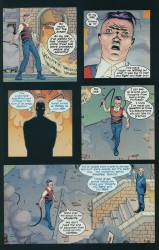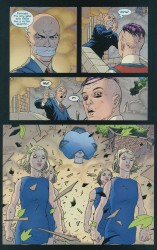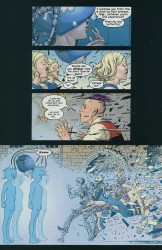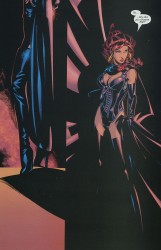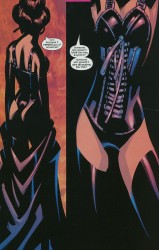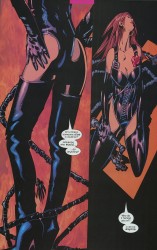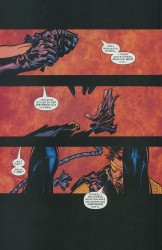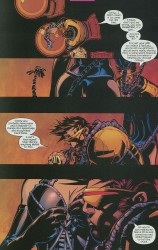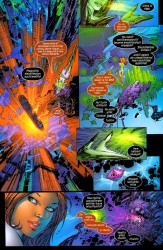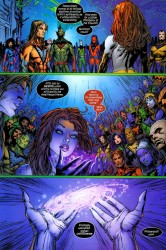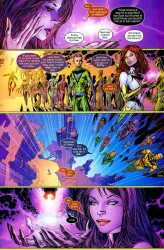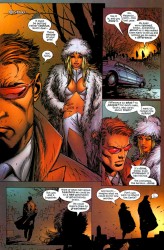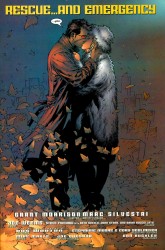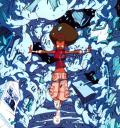Grant Morrison ruined the X-Men when he wrote New X-Men.
No, really, it’s true. Look at Marvel’s moves after he left the book. The very first thing they did was launch X-Men: Reload, a branding and soft-relaunch initiative that saw Chris Claremont put on Uncanny X-Men, Chuck Austen placed on the last two issues of New X-Men (where he cleaned up plots that were already perfectly clean), and Joss Whedon hired to write what turned out to be one long love letter to the glory days of Claremont/Byrne Uncanny X-Men.
Later, they reduced the total number of mutants to the low three figures, a huge change from Morrison’s population of millions.
Morrison pulled the X-Men into the modern day, not even the future, and Marvel’s move after he left was to immediately dial things back to 1982. It’s a baffling decision, and one that’s hamstrung the X-Men ever since. Whedon’s run went from mildly entertaining to stone cold stupid with a quickness (Space bullet, Professor Xavier in a truck, too-cute dialogue, pretty much everything after issue 12, though granted John Cassaday was awesome throughout), no one remembers Claremont’s run despite the Alan Davis art, Peter Milligan’s run was a non-starter, Brubaker was a tremendous mistake, and Matt Fraction’s run is a little too cute and sandbagged by Greg Land. The best X-Men run since Morrison left was the first year or so of the Mike Carey/Chris Bachalo/Humberto Ramos X-Men, which managed to match the writing with the art and tell a solid story. It was good, however, not great.
New X-Men was great.
“No question, bein a black man is demandin'”
The X-Men have often been seen as a metaphor for oppressed peoples, with black and gay people being the most common ones cited. Morrison looked at this metaphor, looked at real life, and updated the X-Men to reflect that. Being a mutant became cool in the same way that being black is cool. You can buy clothes and music made by mutants and be down. You can even hang out in Mutant Town after dark to show how open-minded and cool you are.
At the same time, that only goes so far– no one wants to be black, or a mutant, when the things go down or the cops show up. So when Xorn visits Mutant Town and ends up witnessing the death of a young mutant? The humans react the way they always have: with fear and bigotry.
Morrison turned mutants into a subculture, a logical extension of what happens when new elements are introduced into society. They were still oppressed, but they actually had some kind of culture to go along with their oppression. He gave them their own Chinatown, their own Little Italy, and made it a point to show that mutants, while not entirely accepted just yet, were more than just mutant paramilitary teams. There were ugly mutants, ones with useless powers, ones with hideous powers, and ones who just didn’t really care about the X-Men.
These Are The Days of Our Lives
The soap opera was a huge part of the draw of Claremont’s, and everyone else’s, X-Men, Morrison included. However, where the previous soap operas tended toward being the status quo (Rogue and Gambit’s will they/won’t they, Scott and Jean’s alternating marital strife and bliss, Storm being aloof and faux-queenish, Iceman being an idiot), Morrison took them and forced actual change.
Jean Grey embraced her amazing powers, rather than being afraid of them and found true peace and confidence. Wolverine goes from a beast of a man to a man who has figured out how to keep the beast under control through discipline and poise. Emma Frost found love. Magneto found out what it really takes to change the world. And so on.
My favorite change, though, is Cyclops. He went through something horrible and traumatic, and after, he didn’t feel the same. He felt like he didn’t measure up to the storybook romance that he found himself in, and was worried about not being perfect enough for his (in his eyes) perfect wife. And it hurts their relationship, they grow apart, and he eventually finds someone else.
It’s a bad thing, but at the same time, believable. His friends warn him off, tell him he’s being stupid, and he still does it. And when the missus finds out, what’s he do? He leaves to get drunk. He reacts poorly to a situation he simply doesn’t know how to handle, and ends up adventuring with Wolverine.
And you know what? It works. It pulls Cyclops away from being the stick in the mud, generic leader type he’d been for years. He even sticks to the Marvel blueprint: he struggles with a personal problem, makes a poor decision, and somehow ends up sticking the landing.
Grown Man Business
Grant Morrison made the X-Men grown-up. He eschewed stereotypical supervillain stories until the tail end of his run, and even those stories were layered with a depth of character and nuance that kept them above generic megalomania. When Magneto nearly destroys New York as the culmination of his big plan, he’s forced to confront the fact that the personality he created to further his plan, the healer Xorn, is better liked and more effective than he could ever be. No one wants Magneto any more. Magneto is old and busted, Xorn is the new hotness.
That’s what Morrison’s New X-Men run was about: the new. Mutants as subculture, the changes Beast has gone through, Wolverine fighting against his true nature, Jean loving herself and her powers, and Magneto joining the X-Men and doing more good than he ever did before. All of that is pushing the X-Men toward the new.
The X-Men, moreso than any other franchise, needs to be on the cutting edge of culture. The oppression metaphor practically requires it. Morrison put them right out there, threw a bunch of new ideas and philosophies into the mix, and created something amazing.
And ever since, Marvel has run screaming from it. Major developments were dialed back, retcons applied, and hands waved. The X-Men line, post-NXM, has been, to be kind, a complete mess. It’s finally found focus recently, but New X-Men? That was years ago.
They would have been better off embracing it wholeheartedly, rather than depowering all the mutants, reinforcing 15 year old status quos, and generally putting out bad comics. Morrison laid the ground work for a whole new generation of X-Men comics. We could’ve seen the tales of a new class of New Mutants who had no interest in being soldiers, explored mutant subculture in-depth, examined how humans react to having a brand new and vibrant subculture evolve right under their noses, or even just shown an X-Men team that didn’t solve all its problems by hitting things really hard.
The seeds for all of this are right there in New X-Men. But, we’ll never see it. Marvel got to the end of NXM, recoiled, and ran in the opposite direction. Now we’re just left, once again, with re-runs of our grief. The potential for the X-Men to be more than they were, and are, is gone. It’s sad, but it’s true. After New X-Men, the franchise took a hard turn into a brick wall.
Marvel hasn’t totally run from it, though. You can still buy the series in three handsome softcover volumes. I absolutely recommend it. It’s definitely my favorite X-Men story.

